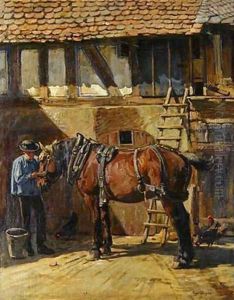Karl Gottlieb Lenz Paintings
Karl Gottlieb Lenz was a German artist known for his contributions to painting and engraving during the 19th century. Born in 1807, Lenz's work is often associated with the Romantic movement, a period characterized by emphasis on emotion and individualism as well as glorification of the past and nature. Despite the lack of extensive documentation on his personal life, Lenz's artistic legacy is preserved through his detailed and evocative landscapes, portraits, and historical scenes.
Lenz received his artistic training in Germany, where he was deeply influenced by the Romantic ideals of his time. He was known to have a keen eye for capturing the intricate details of nature, and his landscapes often depicted the German countryside with a sense of nostalgia and ethereal beauty. His work not only reflects the Romantic fascination with nature but also incorporates elements of realism, showcasing his ability to depict the world with accuracy and sensitivity.
Throughout his career, Lenz exhibited his work in various galleries and became a respected figure among his contemporaries. Despite facing the challenges of the artistic community of his time, including the evolving tastes and the rise of new art movements, Lenz remained committed to his style and vision. His engravings, which often served as illustrations for books and periodicals, contributed to the spread of his reputation beyond the borders of Germany.
Karl Gottlieb Lenz passed away in 1863, leaving behind a body of work that continues to be appreciated for its beauty and historical value. While he may not be as widely recognized as some of his contemporaries, Lenz's contributions to the world of art have earned him a place in the annals of 19th-century German painting and engraving. His work remains a testament to the Romantic spirit, capturing the essence of an era that valued emotion, nature, and the power of the individual artist.
